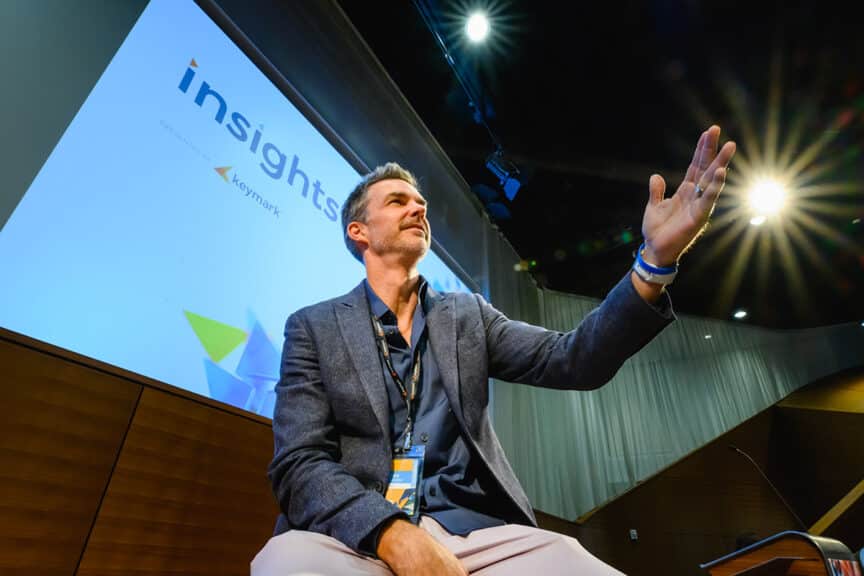At our annual Insights conference, KeyMark had the pleasure of hosting author and former Advoco owner, Marty Osborn, to talk about leadership strategies learned from a lifetime of business, blogging, leading teams, and being led.
Why it mattered?
Because there is no escaping leadership. Business would be easy if people weren’t involved. People can be chaotic, prone to mistakes, sometimes rude, and most frustratingly, unique. In a business where automating the easily repeatable is our bread and butter, people are like the settings on a toaster – insanely varied depending on the model and never producing the exact same result.
Yet everyone is in the business of people. From daily interactions with peers, subordinates and supervisors, to communicating with end users, customers and constituents.
What makes a better leader?
“You don’t need to be a posterior orifice to be a great leader!”
Alright, so those aren’t the exact words Marty used but mother always said, “Be specific. Be scientific.” The point is that you don’t need to disrespect and neglect your employees to be the leader of a successful business. Yet many, if not all of us, could point to at least one boss from the past or present that could be best described as a piece of work. So, what’s the alternative?
Understand that IQ ≠ EQ
According to Harvard Business Review, one quintessential characteristic of great leaders is emotional intelligence. Knowing and understanding “what people crave, versus what crushes them” is as crucial as understanding the strengths and weaknesses of your team.
“Don’t be the hero”
It might actually be impossible to be in business today without hearing about Donald Miller’s “Building a Story Brand”. In the event that you, the reader, are the exception to that rule – businesses and customers can mirror the structure of some of the greatest stories where a hero (ex. Luke Skywalker, Frodo Baggins, etc.) encounters a guide (ex. Obi Wan, Gandalf, etc.) to succeed in a great quest.
A leader is not the hero. A leader is the guide that’s there to mentor and equip their team of heroes with the tools they need to succeed (the force, a lightsaber, Samwise the Brave, you get it.)
Convincing yourself that the positive result of a project would be impossible without your presence is the wrong mindset.
Become someone that people are happy to see
Marty had a beautifully melancholy sentiment at the Insights conference,
“We aren’t able to witness our own eulogy, but we are writing it everyday.”
We don’t condone gossip, but it happens. What people say about you when you’re not in the room — or in this case, not alive — is what they actually think about you. Consider, if you could witness that eulogy, what would the sentiment be? Are you someone that motivated individuals, leading by example and through positive reinforcement? Or were you a fear-monger? When you spring out of the casket for the ultimate “GOTCHYA!” Does the congregation groan? Or are they happy to see you?
Just be better
Easy right? Marty walked through the challenges of writing his book, “Finding Significance,” and what that taught him about challenging his brain. Specifically, Marty had a handful of suggestions outlined in his book:
- You need to show up — leaders are present.
- You need to be intentional — leaders are direct.
- You need to provide direction — not just for others, but for yourself.
- You need to shut down that part of the brain that tells you something isn’t possible for fear of failure. I.e. the Lizard Brain.
Oh, you haven’t heard about Triune Brain Theory? Well, neither had we, but a quick Google search and some deep dino-research shows us that, under the Triune Brain theory, the human brain has what’s called the reptilian cortex, which is responsible for survival instincts and our natural fear response.
Marty encouraged everyone to write down a list of their fears, pointing out that the difference between fear and failure is that fears have yet to occur. The reality is that most fears on your list will never actually come true.
Leaders who can turn off their reptilian cortex/lizard brain to proactively mitigate the circumstances of failure and overcome what’s outside of their control make for much more effective leaders because they can lead by example and help peers see all new perspectives.
Tune-in to more Insights conversations on Agentic AI, available online
Marty gave a stunning and feel-good conversation regarding leadership. For more of Marty’s wisdom, check out his new book Finding Significance. For more insights shared at KeyMark’s annual automation conference, be on the lookout for clips and full videos shared on the KeyMark vimeo page.




